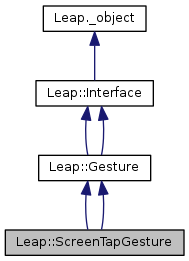#include <Leap.h>

Static Public Member Functions | |
| static Type | classType () |
 Static Public Member Functions inherited from Leap::Gesture Static Public Member Functions inherited from Leap::Gesture | |
| static LEAP_EXPORT const Gesture & | invalid () |
Public Attributes | |
| this | |
 Public Attributes inherited from Leap::Gesture Public Attributes inherited from Leap::Gesture | |
| this | |
Static Public Attributes | |
| class_type = staticmethod(LeapPython.ScreenTapGesture_class_type) | |
| direction = _swig_property(LeapPython.ScreenTapGesture_direction_get) | |
| pointable = _swig_property(LeapPython.ScreenTapGesture_pointable_get) | |
| position = _swig_property(LeapPython.ScreenTapGesture_position_get) | |
| progress = _swig_property(LeapPython.ScreenTapGesture_progress_get) | |
 Static Public Attributes inherited from Leap::Gesture Static Public Attributes inherited from Leap::Gesture | |
| duration = _swig_property(LeapPython.Gesture_duration_get) | |
| duration_seconds = _swig_property(LeapPython.Gesture_duration_seconds_get) | |
| frame = _swig_property(LeapPython.Gesture_frame_get) | |
| hands = _swig_property(LeapPython.Gesture_hands_get) | |
| id = _swig_property(LeapPython.Gesture_id_get) | |
| is_valid = _swig_property(LeapPython.Gesture_is_valid_get) | |
| pointables = _swig_property(LeapPython.Gesture_pointables_get) | |
| state = _swig_property(LeapPython.Gesture_state_get) | |
| STATE_INVALID = LeapPython.Gesture_STATE_INVALID | |
| STATE_START = LeapPython.Gesture_STATE_START | |
| STATE_STOP = LeapPython.Gesture_STATE_STOP | |
| STATE_UPDATE = LeapPython.Gesture_STATE_UPDATE | |
| type = _swig_property(LeapPython.Gesture_type_get) | |
| TYPE_CIRCLE = LeapPython.Gesture_TYPE_CIRCLE | |
| TYPE_INVALID = LeapPython.Gesture_TYPE_INVALID | |
| TYPE_KEY_TAP = LeapPython.Gesture_TYPE_KEY_TAP | |
| TYPE_SCREEN_TAP = LeapPython.Gesture_TYPE_SCREEN_TAP | |
| TYPE_SWIPE = LeapPython.Gesture_TYPE_SWIPE | |
Static Private Attributes | |
| __getattr__ = lambdaself,name:_swig_getattr(self, ScreenTapGesture, name) | |
| __repr__ = _swig_repr | |
| __setattr__ = lambdaself,name,value:_swig_setattr(self, ScreenTapGesture, name, value) | |
| __swig_destroy__ = LeapPython.delete_ScreenTapGesture | |
| dictionary | __swig_getmethods__ = {} |
| dictionary | __swig_setmethods__ = {} |
Additional Inherited Members | |
 Public Types inherited from Leap::Gesture Public Types inherited from Leap::Gesture | |
| enum | State { STATE_INVALID = -1, STATE_START = 1, STATE_UPDATE = 2, STATE_STOP = 3 } |
| enum | Type { TYPE_INVALID = -1, TYPE_SWIPE = 1, TYPE_CIRCLE = 4, TYPE_SCREEN_TAP = 5, TYPE_KEY_TAP = 6 } |
 Protected Member Functions inherited from Leap::Interface Protected Member Functions inherited from Leap::Interface | |
| template<typename T > | |
| T * | get () const |
| LEAP_EXPORT | Interface (void *owner) |
| LEAP_EXPORT | Interface (Implementation *reference, void *owner) |
| LEAP_EXPORT | Interface (const Interface &rhs) |
| Interface (class SharedObject *object) | |
| LEAP_EXPORT Interface & | operator= (const Interface &rhs) |
| virtual LEAP_EXPORT | ~Interface () |
 Static Protected Member Functions inherited from Leap::Interface Static Protected Member Functions inherited from Leap::Interface | |
| static LEAP_EXPORT void | deleteCString (const char *cstr) |
 Protected Attributes inherited from Leap::Interface Protected Attributes inherited from Leap::Interface | |
| class SharedObject * | m_object |
Detailed Description
The ScreenTapGesture class represents a tapping gesture by a finger or tool.
A screen tap gesture is recognized when the tip of a finger pokes forward and then springs back to approximately the original position, as if tapping a vertical screen. The tapping finger must pause briefly before beginning the tap.

Important: To use screen tap gestures in your application, you must enable recognition of the screen tap gesture. You can enable recognition with:
ScreenTap gestures are discrete. The ScreenTapGesture object representing a tap always has the state, STATE_STOP. Only one ScreenTapGesture object is created for each screen tap gesture recognized.
You can set the minimum finger movement and velocity required for a movement to be recognized as a screen tap as well as adjust the detection window for evaluating the movement using the config attribute of a connected Controller object. Use the following keys to configure screen tap recognition:
==================================== ========== ============= ======= Key string Value type Default value Units ==================================== ========== ============= ======= Gesture.ScreenTap.MinForwardVelocity float 50 mm/s Gesture.ScreenTap.HistorySeconds float 0.1 s Gesture.ScreenTap.MinDistance float 5.0 mm ==================================== ========== ============= =======
The following example demonstrates how to set the screen tap configuration parameters:
The Controller object must be connected to the Leap Motion service/daemon before setting the configuration parameters.
- Since
- 1.0
Constructor & Destructor Documentation
| LEAP_EXPORT Leap::ScreenTapGesture::ScreenTapGesture | ( | ) |
Constructs a new ScreenTapGesture object.
An uninitialized ScreenTapGesture object is considered invalid. Get valid instances of the ScreenTapGesture class from a Frame object.
- Since
- 1.0
| LEAP_EXPORT Leap::ScreenTapGesture::ScreenTapGesture | ( | const Gesture & | rhs | ) |
Constructs a ScreenTapGesture object from an instance of the Gesture class.
- Parameters
-
rhs The Gesture instance to specialize. This Gesture instance must be a ScreenTapGesture object.
- Since
- 1.0
Member Function Documentation
|
inlinestatic |
| LEAP_EXPORT Vector Leap::ScreenTapGesture::direction | ( | ) | const |
| LEAP_EXPORT Pointable Leap::ScreenTapGesture::pointable | ( | ) | const |
| LEAP_EXPORT Vector Leap::ScreenTapGesture::position | ( | ) | const |
| LEAP_EXPORT float Leap::ScreenTapGesture::progress | ( | ) | const |
The progress value is always 1.0 for a screen tap gesture.
- Returns
- float The value 1.0.
- Since
- 1.0
Member Data Documentation
|
staticprivate |
|
staticprivate |
|
staticprivate |
|
staticprivate |
|
staticprivate |
|
staticprivate |
|
static |
|
static |
|
static |
|
static |
|
static |
The documentation for this class was generated from the following files: